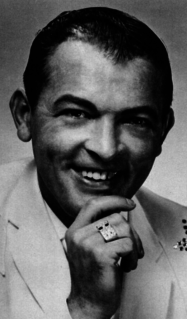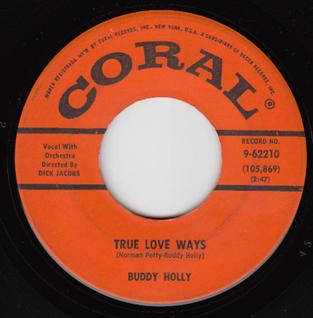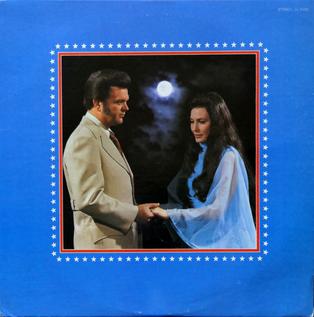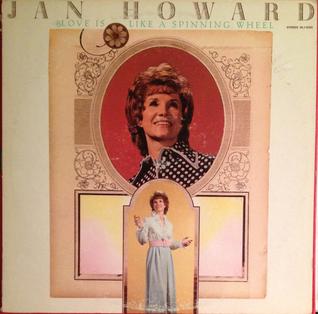
"Rock Around the Clock" is a rock and roll song in the 12-bar blues format written by Max C. Freedman and James E. Myers in 1952. The best-known and most successful rendition was recorded by Bill Haley & His Comets in 1954 for American Decca. It was a number one single for two months and did well on the United Kingdom charts; the recording also reentered the UK Singles Chart in the 1960s and 1970s.
Thomas Rhett Akins Sr. is an American singer and songwriter. Signed to Decca Records between 1994 and 1997, he released two albums for that label, followed by 1998's What Livin's All About on MCA Nashville. Friday Night in Dixie was released in 2002 on Audium Entertainment. Overall, his albums have accounted for fourteen singles on the Billboard Hot Country Songs, including the number one "Don't Get Me Started" from 1996.

Robert Lee Helms was an American country singer, who is best remembered for his 1957 Christmas hit "Jingle Bell Rock". Additionally, he had two other hit records: "Fraulein" and "My Special Angel".

"Champagne Supernova" is a song by English rock band Oasis, written by Noel Gallagher. It is the closing track on the band's second studio album, (What's the Story) Morning Glory? (1995), and was released as the sixth and final single from the album in Australia, France, and New Zealand on 13 May 1996. The Jam frontman Paul Weller appears as a guest guitarist and backing vocalist on the track. A music video for the song, directed by Nigel Dick, was released in 1996. The single was not released in the UK.
"My Dreams Are Getting Better All the Time" is a 1945 popular song.
Woodrow Wilson "Red" Sovine was an American country music singer and songwriter associated with truck driving songs, particularly those recited as narratives but set to music. His most noted examples are "Giddyup Go" (1965) and "Teddy Bear" (1976), both of which topped the Billboard Hot Country Songs chart.

"Before He Cheats" is a song by American singer Carrie Underwood from her debut studio album, Some Hearts (2005). Written by Chris Tompkins and Josh Kear, it was released as the fourth single from the album. The song tells the story of a woman taking revenge on her potentially unfaithful boyfriend/husband.

"Happy Talk" is a show tune from the 1949 Rodgers and Hammerstein musical South Pacific. It is sung by Bloody Mary to the American lieutenant Joe Cable, about having a happy life, after he begins romancing her daughter Liat. Liat performs the song with hand gestures as Mary sings.

"Wagon Wheel" is a song co-written by Bob Dylan and Ketch Secor of Old Crow Medicine Show. Dylan recorded the chorus in 1973; Secor added verses 25 years later. Old Crow Medicine Show's final version was certified Platinum by the Recording Industry Association of America in April 2013. The song has been covered numerous times, including charting versions by Nathan Carter in 2012 and Darius Rucker in 2013.

"True Love Ways" is a song attributed to Norman Petty and Buddy Holly. Buddy Holly's original was recorded with the Dick Jacobs Orchestra in October 1958, four months before the singer's death. It was first released on the posthumous album The Buddy Holly Story, Vol. 2, in March 1960. The song was first released as a single in Britain in May 1960, reaching number 25 on the UK Singles Chart. It was released the following month in the US, but did not make the charts. In 1988, a UK re-release of the recording by MCA, the single reached no. 65 on the UK singles chart in a 5 week chart run.

"Roll On " is a song written by Dave Loggins, and recorded by American country music band Alabama. It was released in January 1984 as the first single and title track to the band's album Roll On. It was the group's 12th straight No. 1 single on the Billboard magazine Hot Country Singles chart.

Michael Jason Isbell is an American singer-songwriter and guitarist. He is known for his solo career, his work with the band The 400 Unit, and as a member of Drive-By Truckers for six years, from 2001 to 2007. Isbell has won four Grammy Awards.

"Six Days on the Road" is an American song written by Earl Green and Muscle Shoals Sound Studio songwriter Carl Montgomery, made famous by country music singer Dave Dudley. The song was initially recorded by Paul Davis and released in 1961 on the Bulletin label. In 1963, the song became a major hit when released by Dudley, peaking at #2 on the Billboard Hot Country Songs chart and cracking the Top 40 (#32) on the Hot 100, leading to it being hailed as the definitive celebration of the American truck driver.

Lead Me On is the second collaborative studio album by Conway Twitty and Loretta Lynn. It was released on January 17, 1972, by Decca Records.

"Goin' Out of My Head" is a song written by Teddy Randazzo and Bobby Weinstein, initially recorded by Little Anthony and the Imperials in 1964. Randazzo, a childhood friend of the group, wrote the song especially for them, having also supplied the group with their previous Top 20 Hit "I'm on the Outside ". Their original version of the song was a Billboard Top 10 Pop smash, reaching No. 6 on the Billboard Hot 100, and No. 1 in the Canadian RPM-list in 1965. The song peaked at No. 8 on Cashbox magazine's R&B chart. The Little Anthony and the Imperials original recording is the best-known version of the song, although it has since been covered by many other artists, including the Zombies, who released a rendition as their last single on Decca Records.

"East Bound and Down" is a song written by Jerry Reed and Deena Kaye Rose, and recorded by Reed for the soundtrack for the film Smokey and the Bandit. The song features Reed on the lead vocal, and vocalist Gordon Stoker of the Jordanaires on the harmony vocal. It was released in August 1977 as a single on RCA Records. The song's lyrics tell the basic plot line of the movie of making a 28-hour round-trip run from Atlanta, Georgia to Texarkana, Texas and back to illegally transport 400 cases of Coors beer for an after-race celebration.
"Take These Chains from My Heart" is a song by Hank Williams. It was written by Fred Rose and Hy Heath and was recorded at Williams' final recording session on September 23, 1952, in Nashville. The song has been widely praised; Williams' biographer Colin Escott deems it "perhaps the best song [Rose] ever presented to Hank...It was one of the very few songs that sounded somewhat similar to a Hank Williams song." Williams is backed by Tommy Jackson (fiddle), Don Helms, Chet Atkins, Jack Shook, and Floyd "Lightnin'" Chance (bass). In the wake of Williams' death on New Year's Day, 1953, the song shot to No. 1, his final chart-topping hit for MGM Records. Like "Your Cheatin' Heart," the song's theme of despair, so vividly articulated by Williams' typically impassioned singing, reinforced the image of Hank as a tortured, mythic figure.
Bing Crosby Sings with Al Jolson, Bob Hope, Dick Haymes and the Andrews Sisters is a Bing Crosby Decca Records studio 78rpm album of phonograph records featuring Crosby with several of Decca's top artists.

Love Is Like a Spinning Wheel is the twelfth studio album by American country artist Jan Howard. It was released in March 1972 on Decca Records and was produced by Owen Bradley. The album spawned two singles that became minor hits on the Billboard country songs chart. It was one of Howard's final studio albums for the Decca label before departing the label within a year's time.

George Vaughn Horton was an American songwriter and performer. Usually credited as "Vaughn Horton" or "George Vaughn", he wrote or contributed to the success of a number of popular songs, including Choo Choo Ch'Boogie, Hillbilly Fever, Sugar-Foot Rag, Mockin' Bird Hill, and the Christmas song Jolly Old Saint Nicholas.














